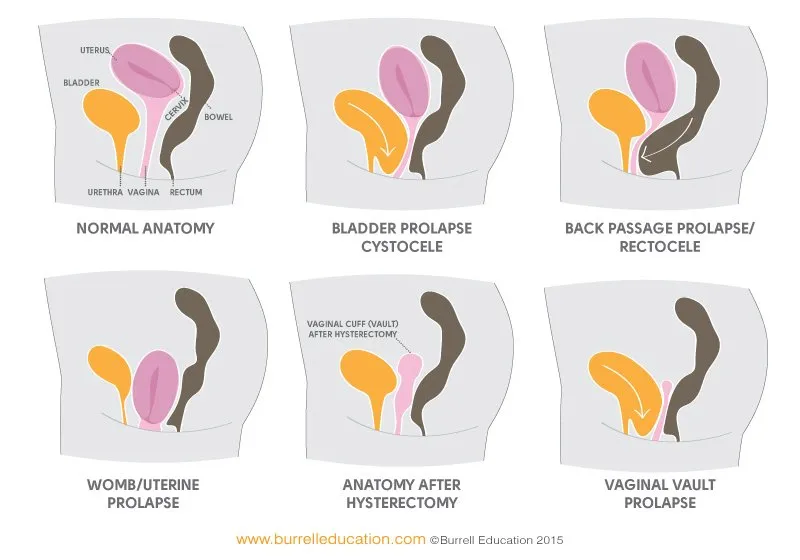Why is it that most women don’t know about pelvic organ prolapse until they have one?
Despite social media, despite better access to healthcare information, most of us still know more about how our phones work than how our bodies work.
Perhaps we prefer to look the other way until something goes wrong.
If ‘something doesn’t feel right down there’ you might go to the doctor and be told you have pelvic organ prolapse. If you Google it, you’re most likely thrown into a downward spiral of despair and terror.
I first heard of pelvic organ prolapse (POP) when I first trained as a Holistic Core Restore coach, and I was speechless. Could it be true that such things could ‘go wrong’ with one’s vagina? I had no idea and I was queasy.
Ten years on and now I know dozens of women who have prolapse: they can run, lift heavy, laugh, jump, get pregnant and crack on with life. Prolapse doesn’t define them and often it doesn’t even bother them.
What is it?
POP is, broadly, the movement of your pelvic organs inside your pelvic bowl. The bladder, rectum, intestine or uterus can lean on to the vagina, causing a bulge inside the vagina. Symptoms vary massively from woman to woman and seem to be unrelated to how much of a bulge is there; but the main symptom is usually a heaviness or dragging sensation in the pelvis. Women might feel or have difficulties fully emptying bladder or bowels; there may be discomfort on penetration; there may be a visible or touchable bulge at the entrance to the vagina.
It’s worth saying that there are varying degrees of prolapse, from mild to moderate to severe.
It’s also worth remembering that in the immediate postnatal period, there’s a LOT going on in the pelvis and a lot of healing will happen in the first six months. What you feel in the early weeks isn’t necessarily what you’re going to feel forever!
Like most conditions of women’s bodies, there’s a lack of research. Things are gradually changing, but between 1990 and 1999 there were a mere 6 studies done on pelvic health in female athlete populations.
A history of pregnancy seems to be the main risk factor – but that doesn’t mean that if you’ve never had a baby, you’ll never have a prolapse.
If you’re diagnosed with prolapse in the first few months after having a baby (as many women are), please don’t panic. The first 1-2 years after birth are a time when your soft tissue (muscles, tendons, ligaments, fascia) are remodelling and healing. In addition to this you’ll be in an altered hormonal state for a while after birth, which changes your body. Your prolapse now isn’t necessarily your prolapse for life, and a mild bulge or laxity in the vagina can rectify itself with time and good conservative practices.
Conservative measures for managing prolapse
The main treatment for a mild to moderate POP is pelvic floor muscle exercise, and, in my opinion, relaxing and releasing tightness in the pelvic floor muscles is just as important as building strength.
It’s also vital to learn to control intra-abdominal pressure: practicing how to exhale on exertion and to not breath-hold when doing hard work (lifting heavy or straining). High pressure in your core pushes down on your pelvic floor and can worsen a prolapse or increase symptoms.

Another essential is to avoid constipation like your life depends on it! You can’t be carrying around extra weight in your pelvis when your organs are compromised; and straining to poo will almost certainly worsen a prolapse.
Some women will benefit from a pessary which can be bought over the counter or fitted by a women’s health physiotherapist. If everything else has been tried, surgery can be a last resort.
Your GP might be helpful and could refer you a physiotherapist, but you can also book an appointment with a women’s health physiotherapist in private practice. Edinburgh has more and more women’s health physiotherapists every month at the moment, which is great news!
Here’s what I’d like you to remember most:
If you think you may have a prolapse or you’ve been told you do, please do not panic.
Your life is not over. Like any condition, you will find ways to manage your symptoms – perhaps you already have conditions that you have learned to manage over time, and prolapse is no exception.


